Critique of the Undisclosed Principal Doctrine in Agency Law
VerifiedAdded on 2023/05/29
|19
|5741
|57
Essay
AI Summary
This essay critically analyzes the doctrine of the undisclosed principal in the context of international business transactions. It begins by defining the doctrine and highlighting its contentious nature, often described as anomalous due to its deviation from standard agency principles where a direct link is expected between the principal and third party. The essay explores arguments for and against the doctrine, examining its historical development and legal interpretations, including key cases such as Schrimshire vs. Alder ton, and Keighley, Maxstead & Co. vs. Durant. It delves into the implications of the doctrine, such as the rights of undisclosed principals to sue and be sued, even when the third party is unaware of their existence. The analysis covers different theories, including the identity theory and the implied contract basis, evaluating the commercial and economic advantages of the doctrine. The essay concludes by considering whether the doctrine should be amended or discarded, weighing its practical benefits against its theoretical inconsistencies and ultimately arguing for a nuanced understanding of its place in agency law.
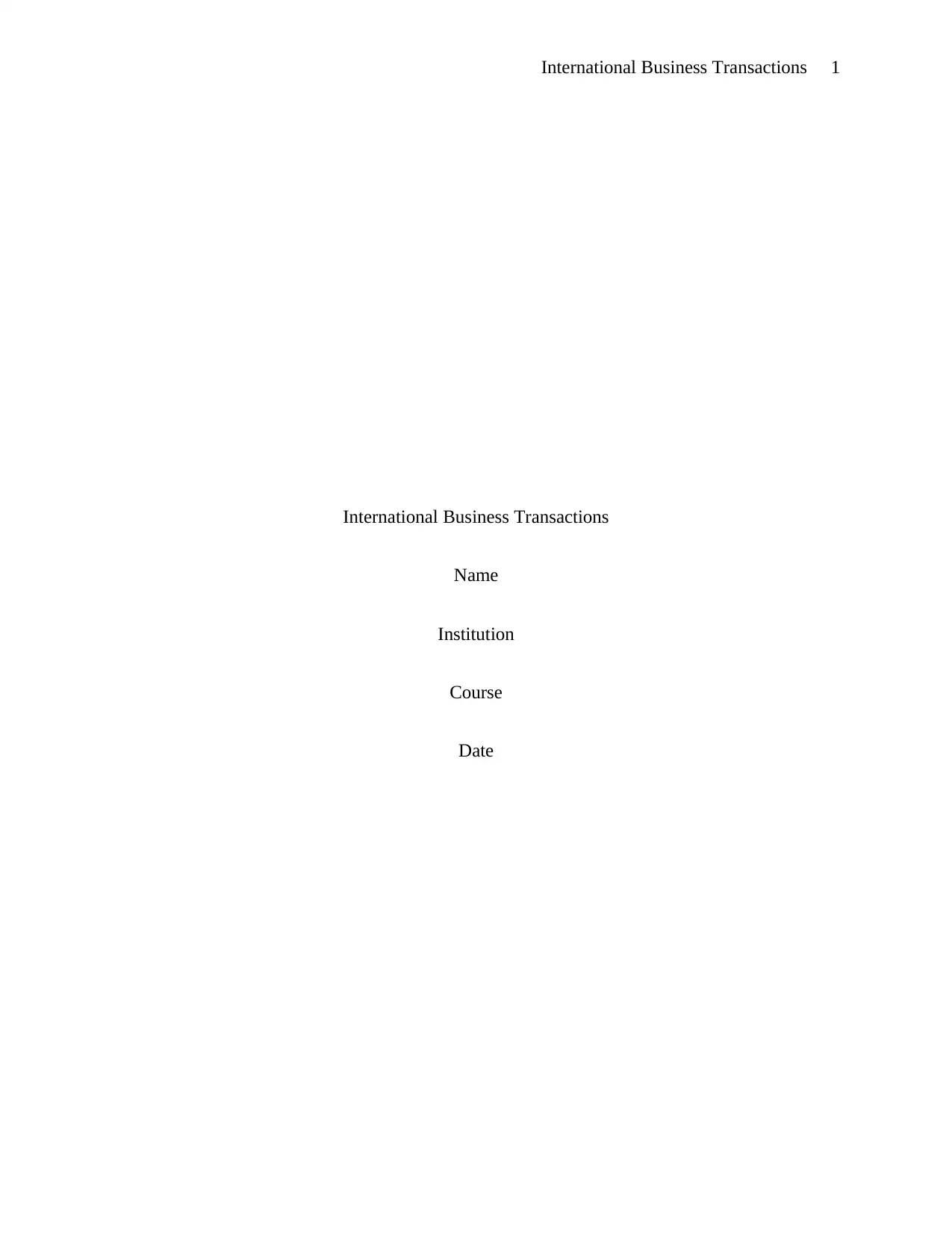
International Business Transactions 1
International Business Transactions
Name
Institution
Course
Date
International Business Transactions
Name
Institution
Course
Date
Paraphrase This Document
Need a fresh take? Get an instant paraphrase of this document with our AI Paraphraser
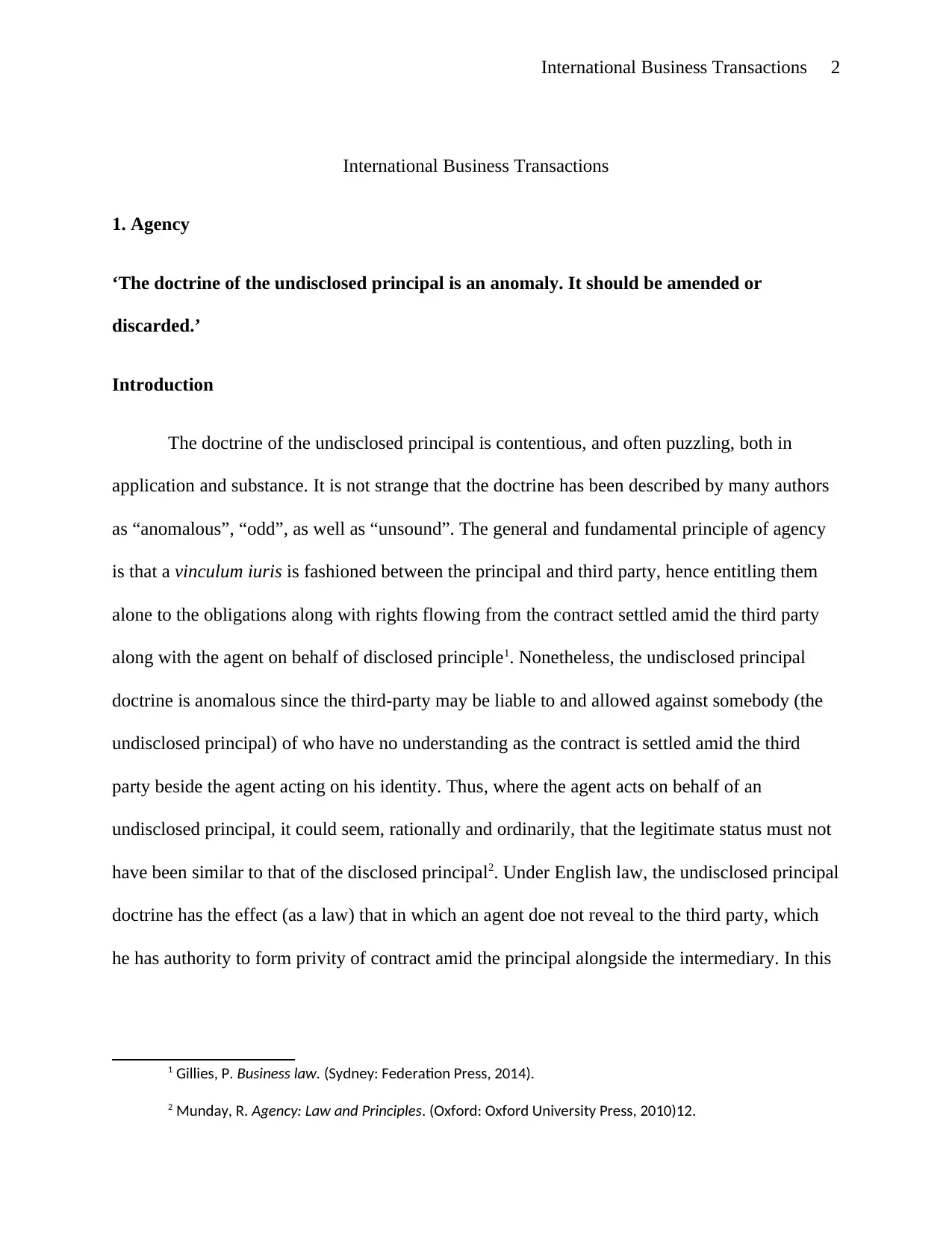
International Business Transactions 2
International Business Transactions
1. Agency
‘The doctrine of the undisclosed principal is an anomaly. It should be amended or
discarded.’
Introduction
The doctrine of the undisclosed principal is contentious, and often puzzling, both in
application and substance. It is not strange that the doctrine has been described by many authors
as “anomalous”, “odd”, as well as “unsound”. The general and fundamental principle of agency
is that a vinculum iuris is fashioned between the principal and third party, hence entitling them
alone to the obligations along with rights flowing from the contract settled amid the third party
along with the agent on behalf of disclosed principle1. Nonetheless, the undisclosed principal
doctrine is anomalous since the third-party may be liable to and allowed against somebody (the
undisclosed principal) of who have no understanding as the contract is settled amid the third
party beside the agent acting on his identity. Thus, where the agent acts on behalf of an
undisclosed principal, it could seem, rationally and ordinarily, that the legitimate status must not
have been similar to that of the disclosed principal2. Under English law, the undisclosed principal
doctrine has the effect (as a law) that in which an agent doe not reveal to the third party, which
he has authority to form privity of contract amid the principal alongside the intermediary. In this
1 Gillies, P. Business law. (Sydney: Federation Press, 2014).
2 Munday, R. Agency: Law and Principles. (Oxford: Oxford University Press, 2010)12.
International Business Transactions
1. Agency
‘The doctrine of the undisclosed principal is an anomaly. It should be amended or
discarded.’
Introduction
The doctrine of the undisclosed principal is contentious, and often puzzling, both in
application and substance. It is not strange that the doctrine has been described by many authors
as “anomalous”, “odd”, as well as “unsound”. The general and fundamental principle of agency
is that a vinculum iuris is fashioned between the principal and third party, hence entitling them
alone to the obligations along with rights flowing from the contract settled amid the third party
along with the agent on behalf of disclosed principle1. Nonetheless, the undisclosed principal
doctrine is anomalous since the third-party may be liable to and allowed against somebody (the
undisclosed principal) of who have no understanding as the contract is settled amid the third
party beside the agent acting on his identity. Thus, where the agent acts on behalf of an
undisclosed principal, it could seem, rationally and ordinarily, that the legitimate status must not
have been similar to that of the disclosed principal2. Under English law, the undisclosed principal
doctrine has the effect (as a law) that in which an agent doe not reveal to the third party, which
he has authority to form privity of contract amid the principal alongside the intermediary. In this
1 Gillies, P. Business law. (Sydney: Federation Press, 2014).
2 Munday, R. Agency: Law and Principles. (Oxford: Oxford University Press, 2010)12.
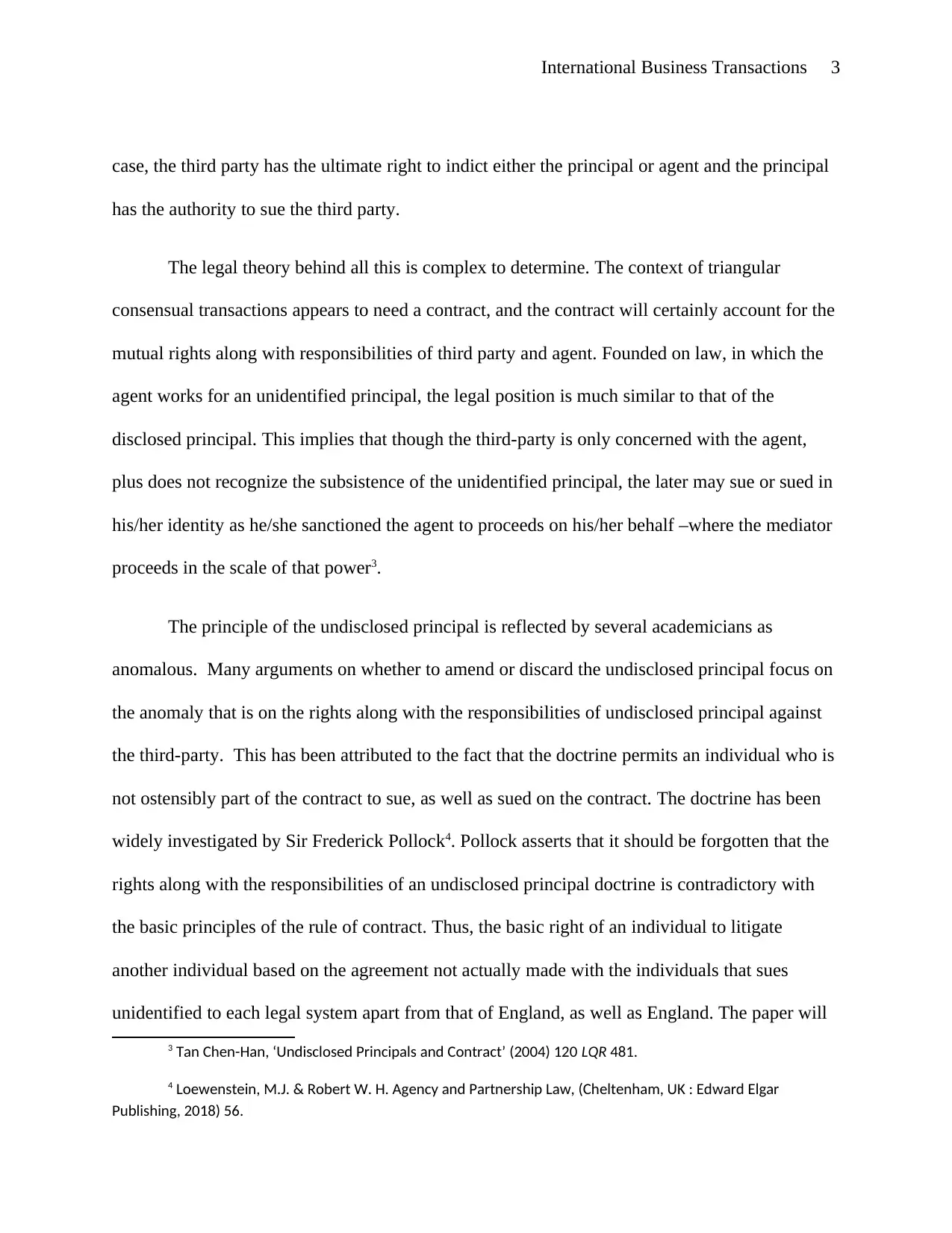
International Business Transactions 3
case, the third party has the ultimate right to indict either the principal or agent and the principal
has the authority to sue the third party.
The legal theory behind all this is complex to determine. The context of triangular
consensual transactions appears to need a contract, and the contract will certainly account for the
mutual rights along with responsibilities of third party and agent. Founded on law, in which the
agent works for an unidentified principal, the legal position is much similar to that of the
disclosed principal. This implies that though the third-party is only concerned with the agent,
plus does not recognize the subsistence of the unidentified principal, the later may sue or sued in
his/her identity as he/she sanctioned the agent to proceeds on his/her behalf –where the mediator
proceeds in the scale of that power3.
The principle of the undisclosed principal is reflected by several academicians as
anomalous. Many arguments on whether to amend or discard the undisclosed principal focus on
the anomaly that is on the rights along with the responsibilities of undisclosed principal against
the third-party. This has been attributed to the fact that the doctrine permits an individual who is
not ostensibly part of the contract to sue, as well as sued on the contract. The doctrine has been
widely investigated by Sir Frederick Pollock4. Pollock asserts that it should be forgotten that the
rights along with the responsibilities of an undisclosed principal doctrine is contradictory with
the basic principles of the rule of contract. Thus, the basic right of an individual to litigate
another individual based on the agreement not actually made with the individuals that sues
unidentified to each legal system apart from that of England, as well as England. The paper will
3 Tan Chen-Han, ‘Undisclosed Principals and Contract’ (2004) 120 LQR 481.
4 Loewenstein, M.J. & Robert W. H. Agency and Partnership Law, (Cheltenham, UK : Edward Elgar
Publishing, 2018) 56.
case, the third party has the ultimate right to indict either the principal or agent and the principal
has the authority to sue the third party.
The legal theory behind all this is complex to determine. The context of triangular
consensual transactions appears to need a contract, and the contract will certainly account for the
mutual rights along with responsibilities of third party and agent. Founded on law, in which the
agent works for an unidentified principal, the legal position is much similar to that of the
disclosed principal. This implies that though the third-party is only concerned with the agent,
plus does not recognize the subsistence of the unidentified principal, the later may sue or sued in
his/her identity as he/she sanctioned the agent to proceeds on his/her behalf –where the mediator
proceeds in the scale of that power3.
The principle of the undisclosed principal is reflected by several academicians as
anomalous. Many arguments on whether to amend or discard the undisclosed principal focus on
the anomaly that is on the rights along with the responsibilities of undisclosed principal against
the third-party. This has been attributed to the fact that the doctrine permits an individual who is
not ostensibly part of the contract to sue, as well as sued on the contract. The doctrine has been
widely investigated by Sir Frederick Pollock4. Pollock asserts that it should be forgotten that the
rights along with the responsibilities of an undisclosed principal doctrine is contradictory with
the basic principles of the rule of contract. Thus, the basic right of an individual to litigate
another individual based on the agreement not actually made with the individuals that sues
unidentified to each legal system apart from that of England, as well as England. The paper will
3 Tan Chen-Han, ‘Undisclosed Principals and Contract’ (2004) 120 LQR 481.
4 Loewenstein, M.J. & Robert W. H. Agency and Partnership Law, (Cheltenham, UK : Edward Elgar
Publishing, 2018) 56.
⊘ This is a preview!⊘
Do you want full access?
Subscribe today to unlock all pages.

Trusted by 1+ million students worldwide
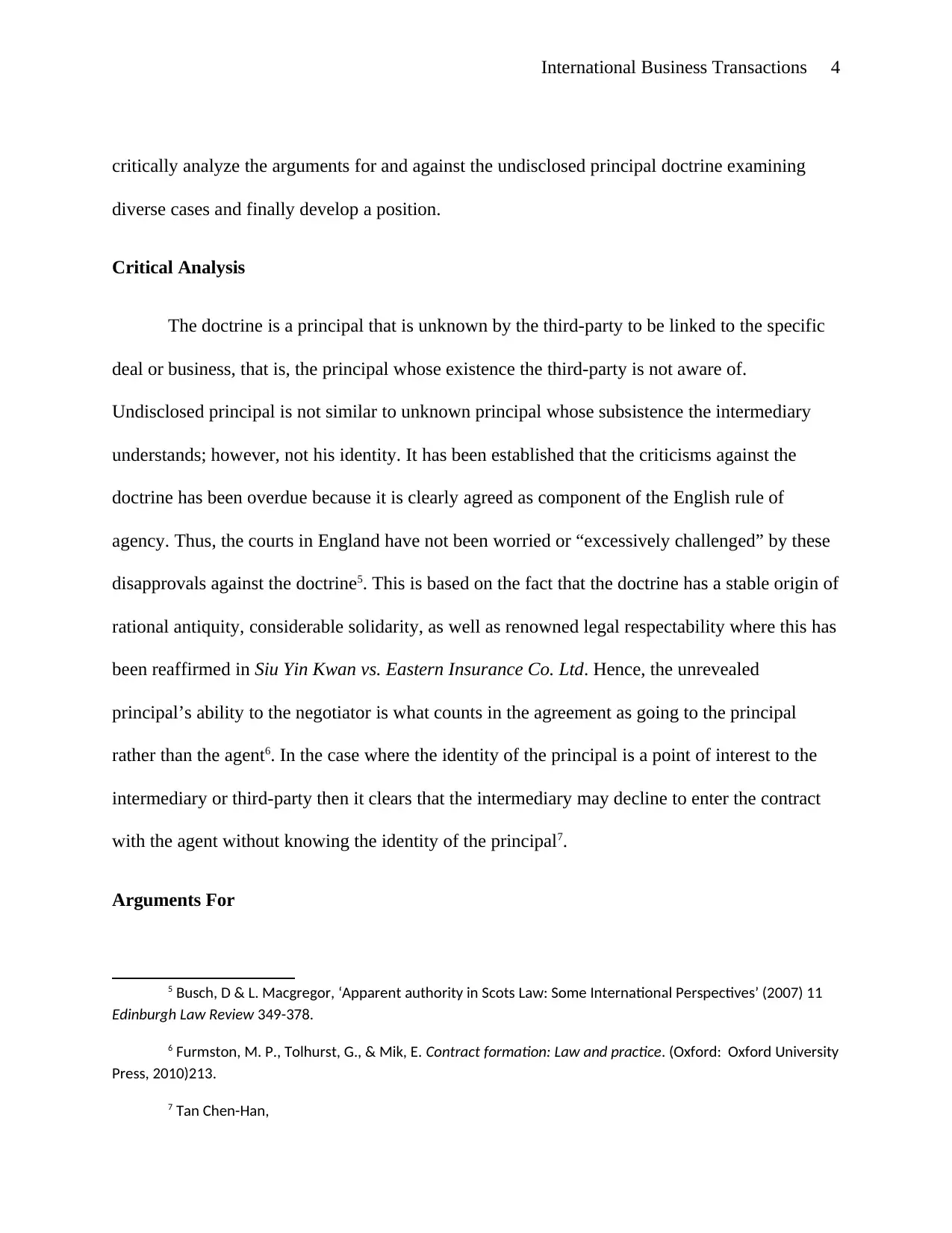
International Business Transactions 4
critically analyze the arguments for and against the undisclosed principal doctrine examining
diverse cases and finally develop a position.
Critical Analysis
The doctrine is a principal that is unknown by the third-party to be linked to the specific
deal or business, that is, the principal whose existence the third-party is not aware of.
Undisclosed principal is not similar to unknown principal whose subsistence the intermediary
understands; however, not his identity. It has been established that the criticisms against the
doctrine has been overdue because it is clearly agreed as component of the English rule of
agency. Thus, the courts in England have not been worried or “excessively challenged” by these
disapprovals against the doctrine5. This is based on the fact that the doctrine has a stable origin of
rational antiquity, considerable solidarity, as well as renowned legal respectability where this has
been reaffirmed in Siu Yin Kwan vs. Eastern Insurance Co. Ltd. Hence, the unrevealed
principal’s ability to the negotiator is what counts in the agreement as going to the principal
rather than the agent6. In the case where the identity of the principal is a point of interest to the
intermediary or third-party then it clears that the intermediary may decline to enter the contract
with the agent without knowing the identity of the principal7.
Arguments For
5 Busch, D & L. Macgregor, ‘Apparent authority in Scots Law: Some International Perspectives’ (2007) 11
Edinburgh Law Review 349-378.
6 Furmston, M. P., Tolhurst, G., & Mik, E. Contract formation: Law and practice. (Oxford: Oxford University
Press, 2010)213.
7 Tan Chen-Han,
critically analyze the arguments for and against the undisclosed principal doctrine examining
diverse cases and finally develop a position.
Critical Analysis
The doctrine is a principal that is unknown by the third-party to be linked to the specific
deal or business, that is, the principal whose existence the third-party is not aware of.
Undisclosed principal is not similar to unknown principal whose subsistence the intermediary
understands; however, not his identity. It has been established that the criticisms against the
doctrine has been overdue because it is clearly agreed as component of the English rule of
agency. Thus, the courts in England have not been worried or “excessively challenged” by these
disapprovals against the doctrine5. This is based on the fact that the doctrine has a stable origin of
rational antiquity, considerable solidarity, as well as renowned legal respectability where this has
been reaffirmed in Siu Yin Kwan vs. Eastern Insurance Co. Ltd. Hence, the unrevealed
principal’s ability to the negotiator is what counts in the agreement as going to the principal
rather than the agent6. In the case where the identity of the principal is a point of interest to the
intermediary or third-party then it clears that the intermediary may decline to enter the contract
with the agent without knowing the identity of the principal7.
Arguments For
5 Busch, D & L. Macgregor, ‘Apparent authority in Scots Law: Some International Perspectives’ (2007) 11
Edinburgh Law Review 349-378.
6 Furmston, M. P., Tolhurst, G., & Mik, E. Contract formation: Law and practice. (Oxford: Oxford University
Press, 2010)213.
7 Tan Chen-Han,
Paraphrase This Document
Need a fresh take? Get an instant paraphrase of this document with our AI Paraphraser
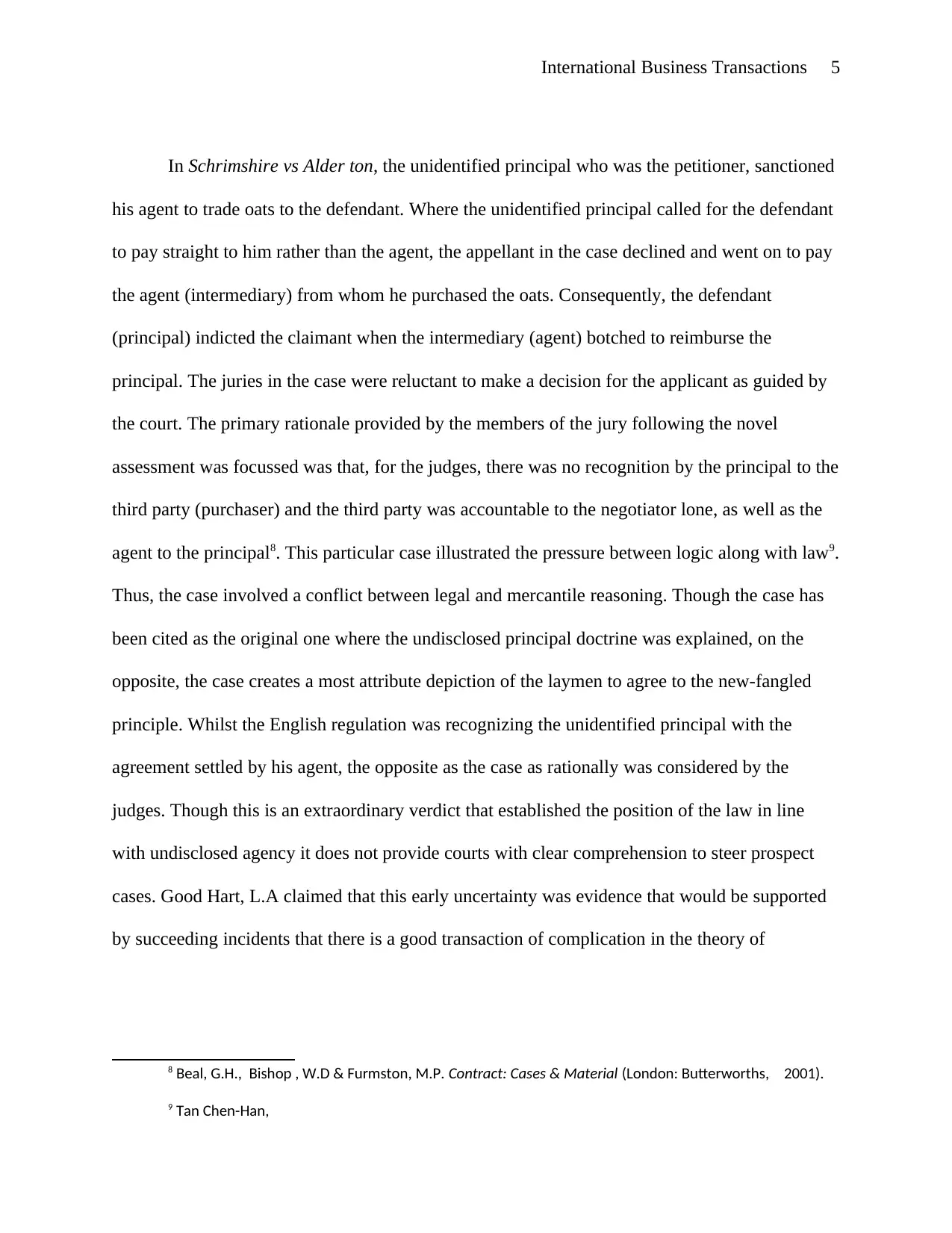
International Business Transactions 5
In Schrimshire vs Alder ton, the unidentified principal who was the petitioner, sanctioned
his agent to trade oats to the defendant. Where the unidentified principal called for the defendant
to pay straight to him rather than the agent, the appellant in the case declined and went on to pay
the agent (intermediary) from whom he purchased the oats. Consequently, the defendant
(principal) indicted the claimant when the intermediary (agent) botched to reimburse the
principal. The juries in the case were reluctant to make a decision for the applicant as guided by
the court. The primary rationale provided by the members of the jury following the novel
assessment was focussed was that, for the judges, there was no recognition by the principal to the
third party (purchaser) and the third party was accountable to the negotiator lone, as well as the
agent to the principal8. This particular case illustrated the pressure between logic along with law9.
Thus, the case involved a conflict between legal and mercantile reasoning. Though the case has
been cited as the original one where the undisclosed principal doctrine was explained, on the
opposite, the case creates a most attribute depiction of the laymen to agree to the new-fangled
principle. Whilst the English regulation was recognizing the unidentified principal with the
agreement settled by his agent, the opposite as the case as rationally was considered by the
judges. Though this is an extraordinary verdict that established the position of the law in line
with undisclosed agency it does not provide courts with clear comprehension to steer prospect
cases. Good Hart, L.A claimed that this early uncertainty was evidence that would be supported
by succeeding incidents that there is a good transaction of complication in the theory of
8 Beal, G.H., Bishop , W.D & Furmston, M.P. Contract: Cases & Material (London: Butterworths, 2001).
9 Tan Chen-Han,
In Schrimshire vs Alder ton, the unidentified principal who was the petitioner, sanctioned
his agent to trade oats to the defendant. Where the unidentified principal called for the defendant
to pay straight to him rather than the agent, the appellant in the case declined and went on to pay
the agent (intermediary) from whom he purchased the oats. Consequently, the defendant
(principal) indicted the claimant when the intermediary (agent) botched to reimburse the
principal. The juries in the case were reluctant to make a decision for the applicant as guided by
the court. The primary rationale provided by the members of the jury following the novel
assessment was focussed was that, for the judges, there was no recognition by the principal to the
third party (purchaser) and the third party was accountable to the negotiator lone, as well as the
agent to the principal8. This particular case illustrated the pressure between logic along with law9.
Thus, the case involved a conflict between legal and mercantile reasoning. Though the case has
been cited as the original one where the undisclosed principal doctrine was explained, on the
opposite, the case creates a most attribute depiction of the laymen to agree to the new-fangled
principle. Whilst the English regulation was recognizing the unidentified principal with the
agreement settled by his agent, the opposite as the case as rationally was considered by the
judges. Though this is an extraordinary verdict that established the position of the law in line
with undisclosed agency it does not provide courts with clear comprehension to steer prospect
cases. Good Hart, L.A claimed that this early uncertainty was evidence that would be supported
by succeeding incidents that there is a good transaction of complication in the theory of
8 Beal, G.H., Bishop , W.D & Furmston, M.P. Contract: Cases & Material (London: Butterworths, 2001).
9 Tan Chen-Han,
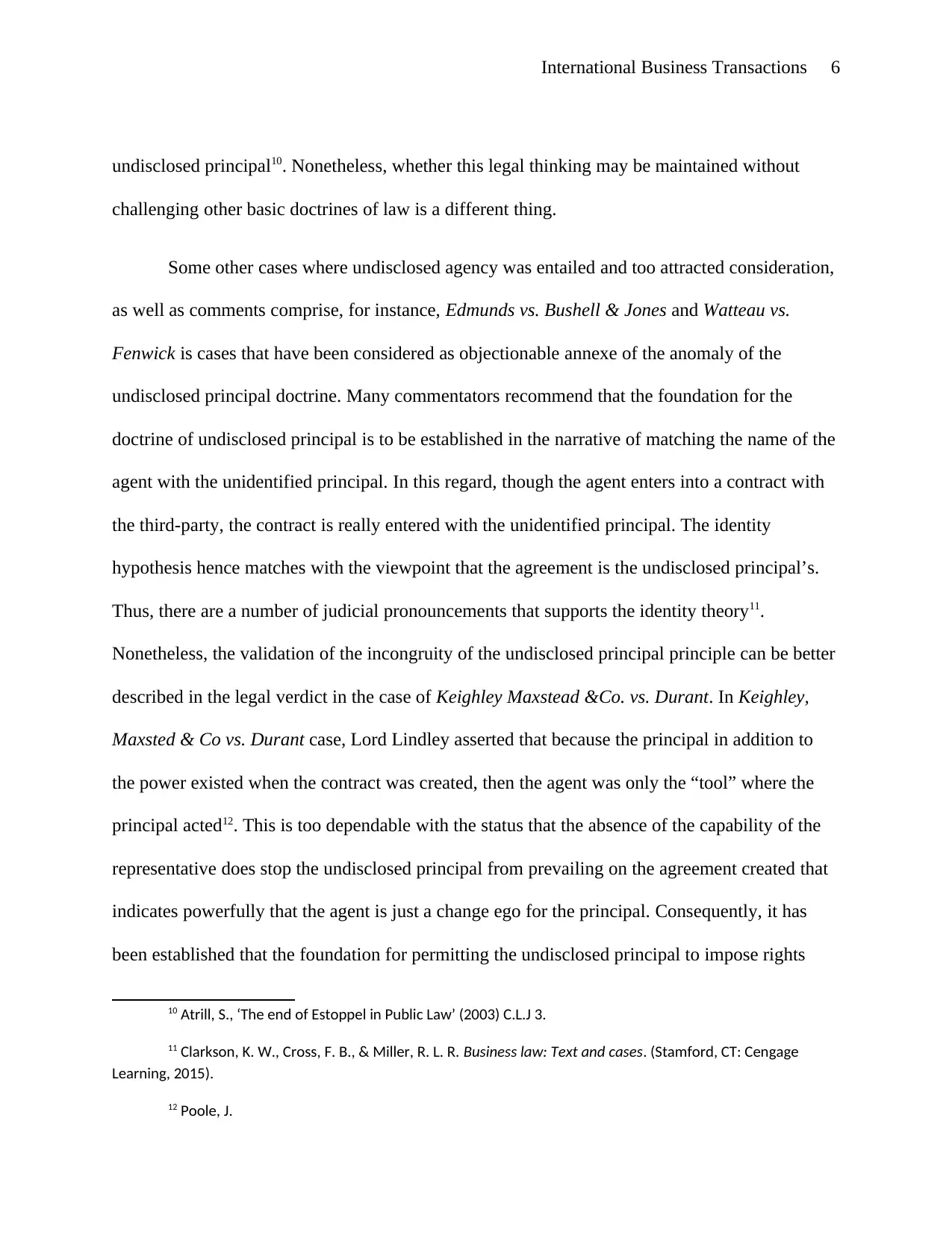
International Business Transactions 6
undisclosed principal10. Nonetheless, whether this legal thinking may be maintained without
challenging other basic doctrines of law is a different thing.
Some other cases where undisclosed agency was entailed and too attracted consideration,
as well as comments comprise, for instance, Edmunds vs. Bushell & Jones and Watteau vs.
Fenwick is cases that have been considered as objectionable annexe of the anomaly of the
undisclosed principal doctrine. Many commentators recommend that the foundation for the
doctrine of undisclosed principal is to be established in the narrative of matching the name of the
agent with the unidentified principal. In this regard, though the agent enters into a contract with
the third-party, the contract is really entered with the unidentified principal. The identity
hypothesis hence matches with the viewpoint that the agreement is the undisclosed principal’s.
Thus, there are a number of judicial pronouncements that supports the identity theory11.
Nonetheless, the validation of the incongruity of the undisclosed principal principle can be better
described in the legal verdict in the case of Keighley Maxstead &Co. vs. Durant. In Keighley,
Maxsted & Co vs. Durant case, Lord Lindley asserted that because the principal in addition to
the power existed when the contract was created, then the agent was only the “tool” where the
principal acted12. This is too dependable with the status that the absence of the capability of the
representative does stop the undisclosed principal from prevailing on the agreement created that
indicates powerfully that the agent is just a change ego for the principal. Consequently, it has
been established that the foundation for permitting the undisclosed principal to impose rights
10 Atrill, S., ‘The end of Estoppel in Public Law’ (2003) C.L.J 3.
11 Clarkson, K. W., Cross, F. B., & Miller, R. L. R. Business law: Text and cases. (Stamford, CT: Cengage
Learning, 2015).
12 Poole, J.
undisclosed principal10. Nonetheless, whether this legal thinking may be maintained without
challenging other basic doctrines of law is a different thing.
Some other cases where undisclosed agency was entailed and too attracted consideration,
as well as comments comprise, for instance, Edmunds vs. Bushell & Jones and Watteau vs.
Fenwick is cases that have been considered as objectionable annexe of the anomaly of the
undisclosed principal doctrine. Many commentators recommend that the foundation for the
doctrine of undisclosed principal is to be established in the narrative of matching the name of the
agent with the unidentified principal. In this regard, though the agent enters into a contract with
the third-party, the contract is really entered with the unidentified principal. The identity
hypothesis hence matches with the viewpoint that the agreement is the undisclosed principal’s.
Thus, there are a number of judicial pronouncements that supports the identity theory11.
Nonetheless, the validation of the incongruity of the undisclosed principal principle can be better
described in the legal verdict in the case of Keighley Maxstead &Co. vs. Durant. In Keighley,
Maxsted & Co vs. Durant case, Lord Lindley asserted that because the principal in addition to
the power existed when the contract was created, then the agent was only the “tool” where the
principal acted12. This is too dependable with the status that the absence of the capability of the
representative does stop the undisclosed principal from prevailing on the agreement created that
indicates powerfully that the agent is just a change ego for the principal. Consequently, it has
been established that the foundation for permitting the undisclosed principal to impose rights
10 Atrill, S., ‘The end of Estoppel in Public Law’ (2003) C.L.J 3.
11 Clarkson, K. W., Cross, F. B., & Miller, R. L. R. Business law: Text and cases. (Stamford, CT: Cengage
Learning, 2015).
12 Poole, J.
⊘ This is a preview!⊘
Do you want full access?
Subscribe today to unlock all pages.

Trusted by 1+ million students worldwide
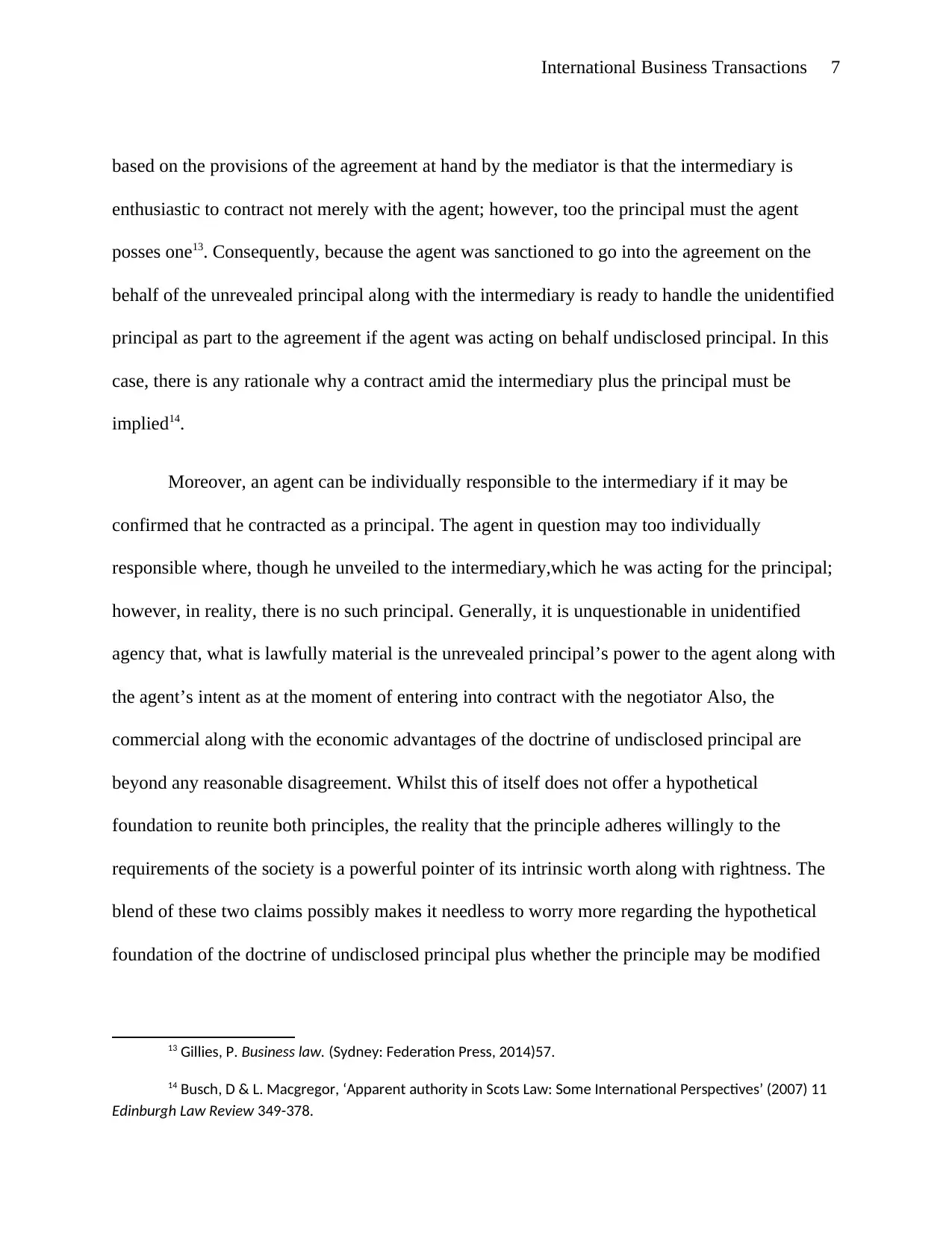
International Business Transactions 7
based on the provisions of the agreement at hand by the mediator is that the intermediary is
enthusiastic to contract not merely with the agent; however, too the principal must the agent
posses one13. Consequently, because the agent was sanctioned to go into the agreement on the
behalf of the unrevealed principal along with the intermediary is ready to handle the unidentified
principal as part to the agreement if the agent was acting on behalf undisclosed principal. In this
case, there is any rationale why a contract amid the intermediary plus the principal must be
implied14.
Moreover, an agent can be individually responsible to the intermediary if it may be
confirmed that he contracted as a principal. The agent in question may too individually
responsible where, though he unveiled to the intermediary,which he was acting for the principal;
however, in reality, there is no such principal. Generally, it is unquestionable in unidentified
agency that, what is lawfully material is the unrevealed principal’s power to the agent along with
the agent’s intent as at the moment of entering into contract with the negotiator Also, the
commercial along with the economic advantages of the doctrine of undisclosed principal are
beyond any reasonable disagreement. Whilst this of itself does not offer a hypothetical
foundation to reunite both principles, the reality that the principle adheres willingly to the
requirements of the society is a powerful pointer of its intrinsic worth along with rightness. The
blend of these two claims possibly makes it needless to worry more regarding the hypothetical
foundation of the doctrine of undisclosed principal plus whether the principle may be modified
13 Gillies, P. Business law. (Sydney: Federation Press, 2014)57.
14 Busch, D & L. Macgregor, ‘Apparent authority in Scots Law: Some International Perspectives’ (2007) 11
Edinburgh Law Review 349-378.
based on the provisions of the agreement at hand by the mediator is that the intermediary is
enthusiastic to contract not merely with the agent; however, too the principal must the agent
posses one13. Consequently, because the agent was sanctioned to go into the agreement on the
behalf of the unrevealed principal along with the intermediary is ready to handle the unidentified
principal as part to the agreement if the agent was acting on behalf undisclosed principal. In this
case, there is any rationale why a contract amid the intermediary plus the principal must be
implied14.
Moreover, an agent can be individually responsible to the intermediary if it may be
confirmed that he contracted as a principal. The agent in question may too individually
responsible where, though he unveiled to the intermediary,which he was acting for the principal;
however, in reality, there is no such principal. Generally, it is unquestionable in unidentified
agency that, what is lawfully material is the unrevealed principal’s power to the agent along with
the agent’s intent as at the moment of entering into contract with the negotiator Also, the
commercial along with the economic advantages of the doctrine of undisclosed principal are
beyond any reasonable disagreement. Whilst this of itself does not offer a hypothetical
foundation to reunite both principles, the reality that the principle adheres willingly to the
requirements of the society is a powerful pointer of its intrinsic worth along with rightness. The
blend of these two claims possibly makes it needless to worry more regarding the hypothetical
foundation of the doctrine of undisclosed principal plus whether the principle may be modified
13 Gillies, P. Business law. (Sydney: Federation Press, 2014)57.
14 Busch, D & L. Macgregor, ‘Apparent authority in Scots Law: Some International Perspectives’ (2007) 11
Edinburgh Law Review 349-378.
Paraphrase This Document
Need a fresh take? Get an instant paraphrase of this document with our AI Paraphraser
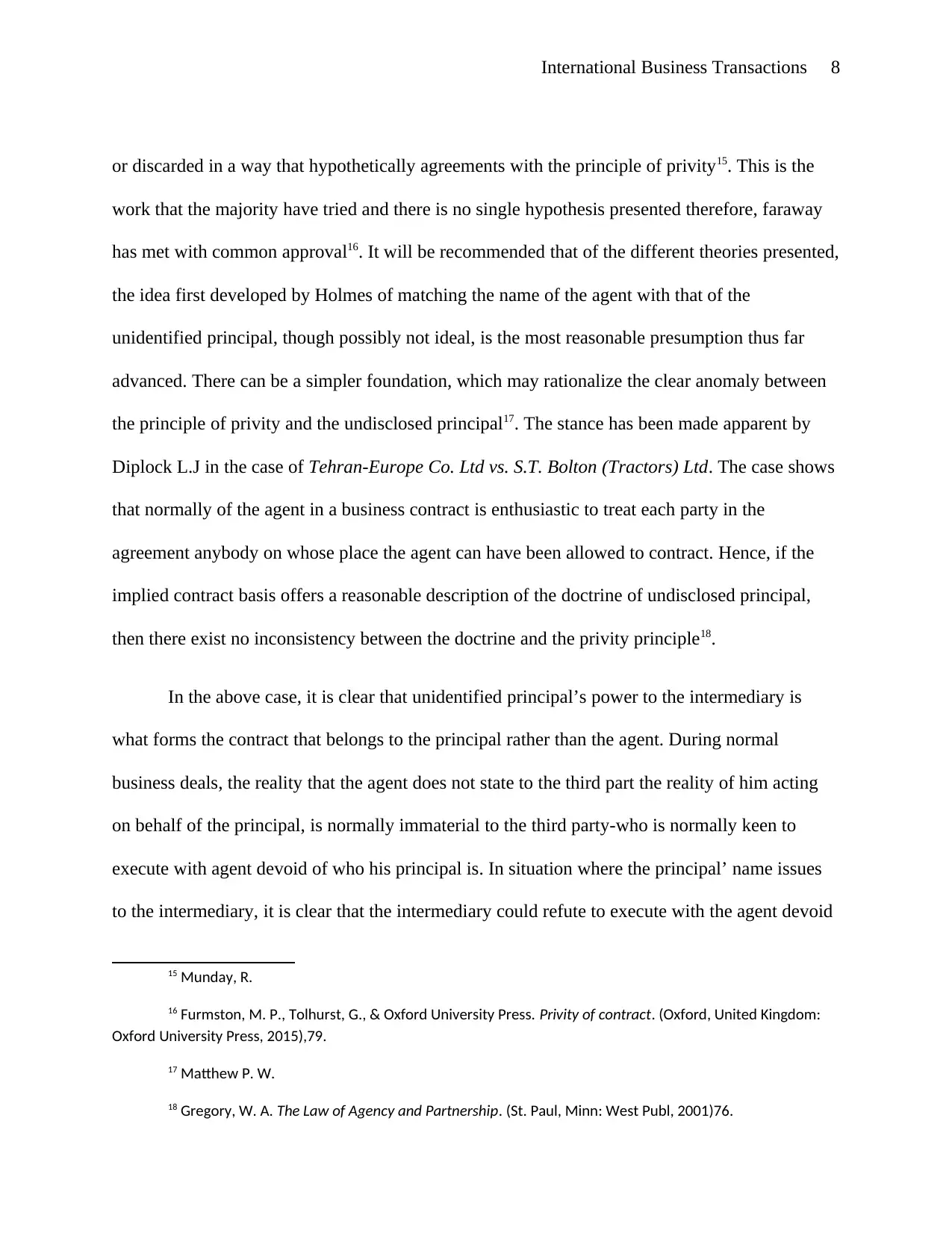
International Business Transactions 8
or discarded in a way that hypothetically agreements with the principle of privity15. This is the
work that the majority have tried and there is no single hypothesis presented therefore, faraway
has met with common approval16. It will be recommended that of the different theories presented,
the idea first developed by Holmes of matching the name of the agent with that of the
unidentified principal, though possibly not ideal, is the most reasonable presumption thus far
advanced. There can be a simpler foundation, which may rationalize the clear anomaly between
the principle of privity and the undisclosed principal17. The stance has been made apparent by
Diplock L.J in the case of Tehran-Europe Co. Ltd vs. S.T. Bolton (Tractors) Ltd. The case shows
that normally of the agent in a business contract is enthusiastic to treat each party in the
agreement anybody on whose place the agent can have been allowed to contract. Hence, if the
implied contract basis offers a reasonable description of the doctrine of undisclosed principal,
then there exist no inconsistency between the doctrine and the privity principle18.
In the above case, it is clear that unidentified principal’s power to the intermediary is
what forms the contract that belongs to the principal rather than the agent. During normal
business deals, the reality that the agent does not state to the third part the reality of him acting
on behalf of the principal, is normally immaterial to the third party-who is normally keen to
execute with agent devoid of who his principal is. In situation where the principal’ name issues
to the intermediary, it is clear that the intermediary could refute to execute with the agent devoid
15 Munday, R.
16 Furmston, M. P., Tolhurst, G., & Oxford University Press. Privity of contract. (Oxford, United Kingdom:
Oxford University Press, 2015),79.
17 Matthew P. W.
18 Gregory, W. A. The Law of Agency and Partnership. (St. Paul, Minn: West Publ, 2001)76.
or discarded in a way that hypothetically agreements with the principle of privity15. This is the
work that the majority have tried and there is no single hypothesis presented therefore, faraway
has met with common approval16. It will be recommended that of the different theories presented,
the idea first developed by Holmes of matching the name of the agent with that of the
unidentified principal, though possibly not ideal, is the most reasonable presumption thus far
advanced. There can be a simpler foundation, which may rationalize the clear anomaly between
the principle of privity and the undisclosed principal17. The stance has been made apparent by
Diplock L.J in the case of Tehran-Europe Co. Ltd vs. S.T. Bolton (Tractors) Ltd. The case shows
that normally of the agent in a business contract is enthusiastic to treat each party in the
agreement anybody on whose place the agent can have been allowed to contract. Hence, if the
implied contract basis offers a reasonable description of the doctrine of undisclosed principal,
then there exist no inconsistency between the doctrine and the privity principle18.
In the above case, it is clear that unidentified principal’s power to the intermediary is
what forms the contract that belongs to the principal rather than the agent. During normal
business deals, the reality that the agent does not state to the third part the reality of him acting
on behalf of the principal, is normally immaterial to the third party-who is normally keen to
execute with agent devoid of who his principal is. In situation where the principal’ name issues
to the intermediary, it is clear that the intermediary could refute to execute with the agent devoid
15 Munday, R.
16 Furmston, M. P., Tolhurst, G., & Oxford University Press. Privity of contract. (Oxford, United Kingdom:
Oxford University Press, 2015),79.
17 Matthew P. W.
18 Gregory, W. A. The Law of Agency and Partnership. (St. Paul, Minn: West Publ, 2001)76.
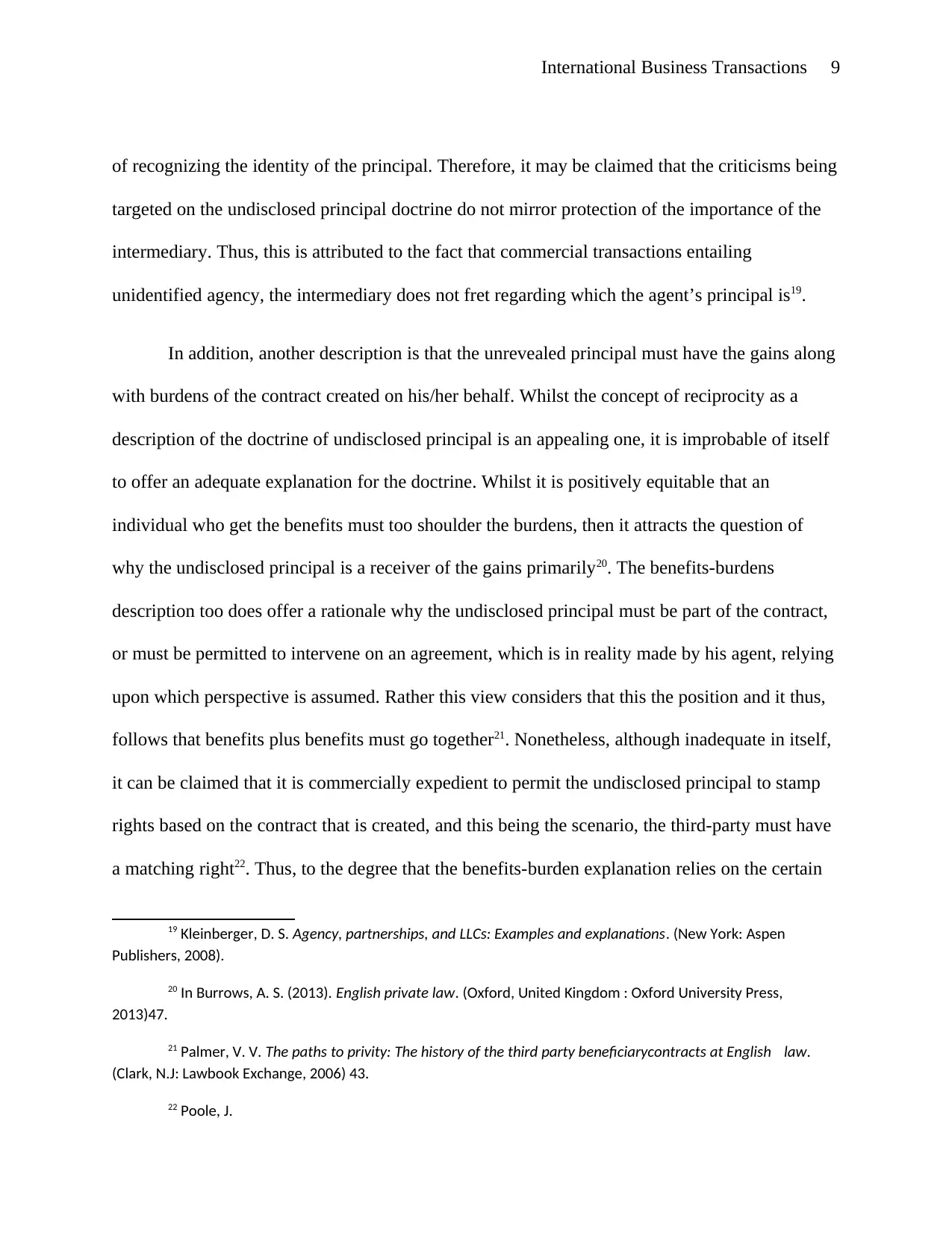
International Business Transactions 9
of recognizing the identity of the principal. Therefore, it may be claimed that the criticisms being
targeted on the undisclosed principal doctrine do not mirror protection of the importance of the
intermediary. Thus, this is attributed to the fact that commercial transactions entailing
unidentified agency, the intermediary does not fret regarding which the agent’s principal is19.
In addition, another description is that the unrevealed principal must have the gains along
with burdens of the contract created on his/her behalf. Whilst the concept of reciprocity as a
description of the doctrine of undisclosed principal is an appealing one, it is improbable of itself
to offer an adequate explanation for the doctrine. Whilst it is positively equitable that an
individual who get the benefits must too shoulder the burdens, then it attracts the question of
why the undisclosed principal is a receiver of the gains primarily20. The benefits-burdens
description too does offer a rationale why the undisclosed principal must be part of the contract,
or must be permitted to intervene on an agreement, which is in reality made by his agent, relying
upon which perspective is assumed. Rather this view considers that this the position and it thus,
follows that benefits plus benefits must go together21. Nonetheless, although inadequate in itself,
it can be claimed that it is commercially expedient to permit the undisclosed principal to stamp
rights based on the contract that is created, and this being the scenario, the third-party must have
a matching right22. Thus, to the degree that the benefits-burden explanation relies on the certain
19 Kleinberger, D. S. Agency, partnerships, and LLCs: Examples and explanations. (New York: Aspen
Publishers, 2008).
20 In Burrows, A. S. (2013). English private law. (Oxford, United Kingdom : Oxford University Press,
2013)47.
21 Palmer, V. V. The paths to privity: The history of the third party beneficiarycontracts at English law.
(Clark, N.J: Lawbook Exchange, 2006) 43.
22 Poole, J.
of recognizing the identity of the principal. Therefore, it may be claimed that the criticisms being
targeted on the undisclosed principal doctrine do not mirror protection of the importance of the
intermediary. Thus, this is attributed to the fact that commercial transactions entailing
unidentified agency, the intermediary does not fret regarding which the agent’s principal is19.
In addition, another description is that the unrevealed principal must have the gains along
with burdens of the contract created on his/her behalf. Whilst the concept of reciprocity as a
description of the doctrine of undisclosed principal is an appealing one, it is improbable of itself
to offer an adequate explanation for the doctrine. Whilst it is positively equitable that an
individual who get the benefits must too shoulder the burdens, then it attracts the question of
why the undisclosed principal is a receiver of the gains primarily20. The benefits-burdens
description too does offer a rationale why the undisclosed principal must be part of the contract,
or must be permitted to intervene on an agreement, which is in reality made by his agent, relying
upon which perspective is assumed. Rather this view considers that this the position and it thus,
follows that benefits plus benefits must go together21. Nonetheless, although inadequate in itself,
it can be claimed that it is commercially expedient to permit the undisclosed principal to stamp
rights based on the contract that is created, and this being the scenario, the third-party must have
a matching right22. Thus, to the degree that the benefits-burden explanation relies on the certain
19 Kleinberger, D. S. Agency, partnerships, and LLCs: Examples and explanations. (New York: Aspen
Publishers, 2008).
20 In Burrows, A. S. (2013). English private law. (Oxford, United Kingdom : Oxford University Press,
2013)47.
21 Palmer, V. V. The paths to privity: The history of the third party beneficiarycontracts at English law.
(Clark, N.J: Lawbook Exchange, 2006) 43.
22 Poole, J.
⊘ This is a preview!⊘
Do you want full access?
Subscribe today to unlock all pages.

Trusted by 1+ million students worldwide
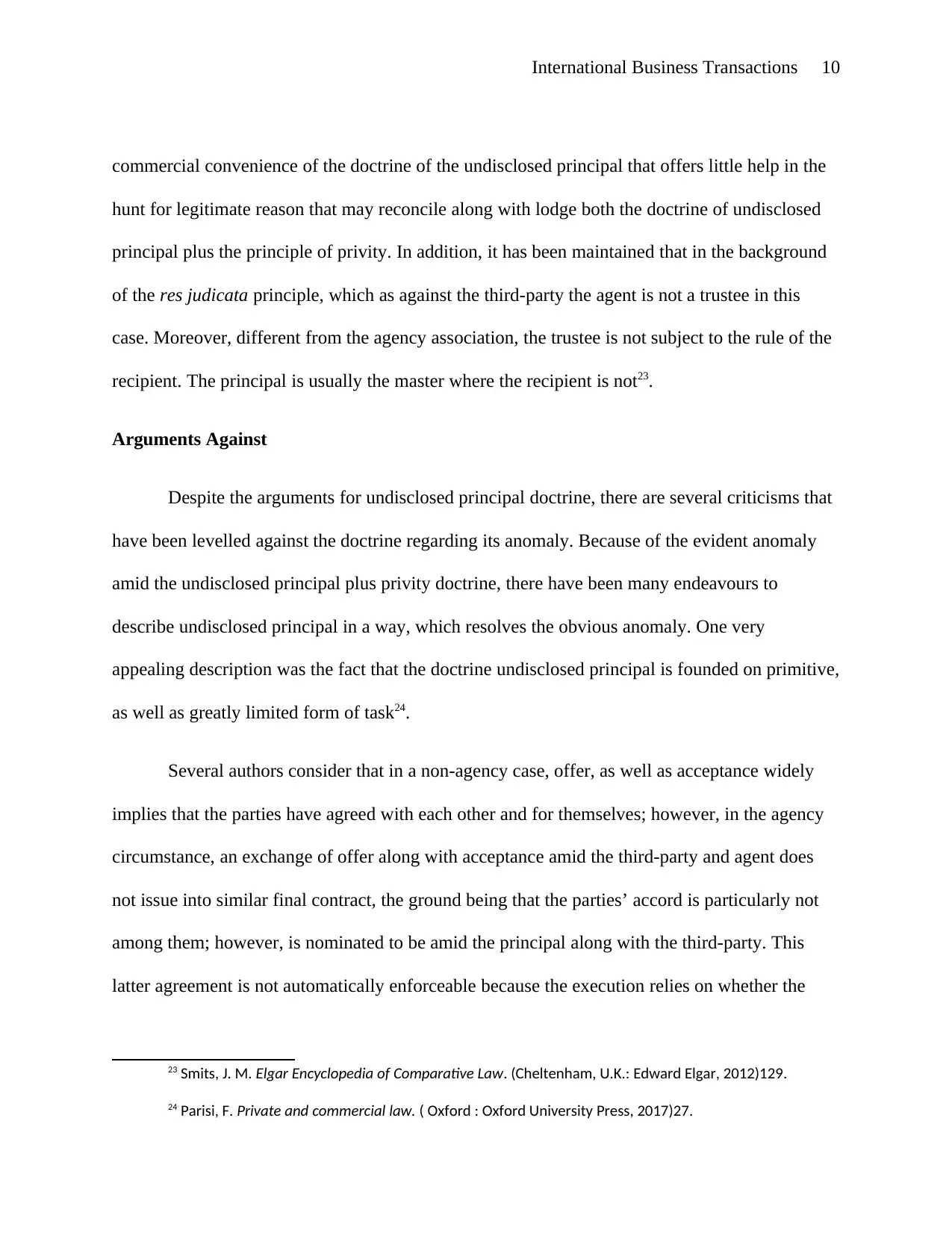
International Business Transactions 10
commercial convenience of the doctrine of the undisclosed principal that offers little help in the
hunt for legitimate reason that may reconcile along with lodge both the doctrine of undisclosed
principal plus the principle of privity. In addition, it has been maintained that in the background
of the res judicata principle, which as against the third-party the agent is not a trustee in this
case. Moreover, different from the agency association, the trustee is not subject to the rule of the
recipient. The principal is usually the master where the recipient is not23.
Arguments Against
Despite the arguments for undisclosed principal doctrine, there are several criticisms that
have been levelled against the doctrine regarding its anomaly. Because of the evident anomaly
amid the undisclosed principal plus privity doctrine, there have been many endeavours to
describe undisclosed principal in a way, which resolves the obvious anomaly. One very
appealing description was the fact that the doctrine undisclosed principal is founded on primitive,
as well as greatly limited form of task24.
Several authors consider that in a non-agency case, offer, as well as acceptance widely
implies that the parties have agreed with each other and for themselves; however, in the agency
circumstance, an exchange of offer along with acceptance amid the third-party and agent does
not issue into similar final contract, the ground being that the parties’ accord is particularly not
among them; however, is nominated to be amid the principal along with the third-party. This
latter agreement is not automatically enforceable because the execution relies on whether the
23 Smits, J. M. Elgar Encyclopedia of Comparative Law. (Cheltenham, U.K.: Edward Elgar, 2012)129.
24 Parisi, F. Private and commercial law. ( Oxford : Oxford University Press, 2017)27.
commercial convenience of the doctrine of the undisclosed principal that offers little help in the
hunt for legitimate reason that may reconcile along with lodge both the doctrine of undisclosed
principal plus the principle of privity. In addition, it has been maintained that in the background
of the res judicata principle, which as against the third-party the agent is not a trustee in this
case. Moreover, different from the agency association, the trustee is not subject to the rule of the
recipient. The principal is usually the master where the recipient is not23.
Arguments Against
Despite the arguments for undisclosed principal doctrine, there are several criticisms that
have been levelled against the doctrine regarding its anomaly. Because of the evident anomaly
amid the undisclosed principal plus privity doctrine, there have been many endeavours to
describe undisclosed principal in a way, which resolves the obvious anomaly. One very
appealing description was the fact that the doctrine undisclosed principal is founded on primitive,
as well as greatly limited form of task24.
Several authors consider that in a non-agency case, offer, as well as acceptance widely
implies that the parties have agreed with each other and for themselves; however, in the agency
circumstance, an exchange of offer along with acceptance amid the third-party and agent does
not issue into similar final contract, the ground being that the parties’ accord is particularly not
among them; however, is nominated to be amid the principal along with the third-party. This
latter agreement is not automatically enforceable because the execution relies on whether the
23 Smits, J. M. Elgar Encyclopedia of Comparative Law. (Cheltenham, U.K.: Edward Elgar, 2012)129.
24 Parisi, F. Private and commercial law. ( Oxford : Oxford University Press, 2017)27.
Paraphrase This Document
Need a fresh take? Get an instant paraphrase of this document with our AI Paraphraser
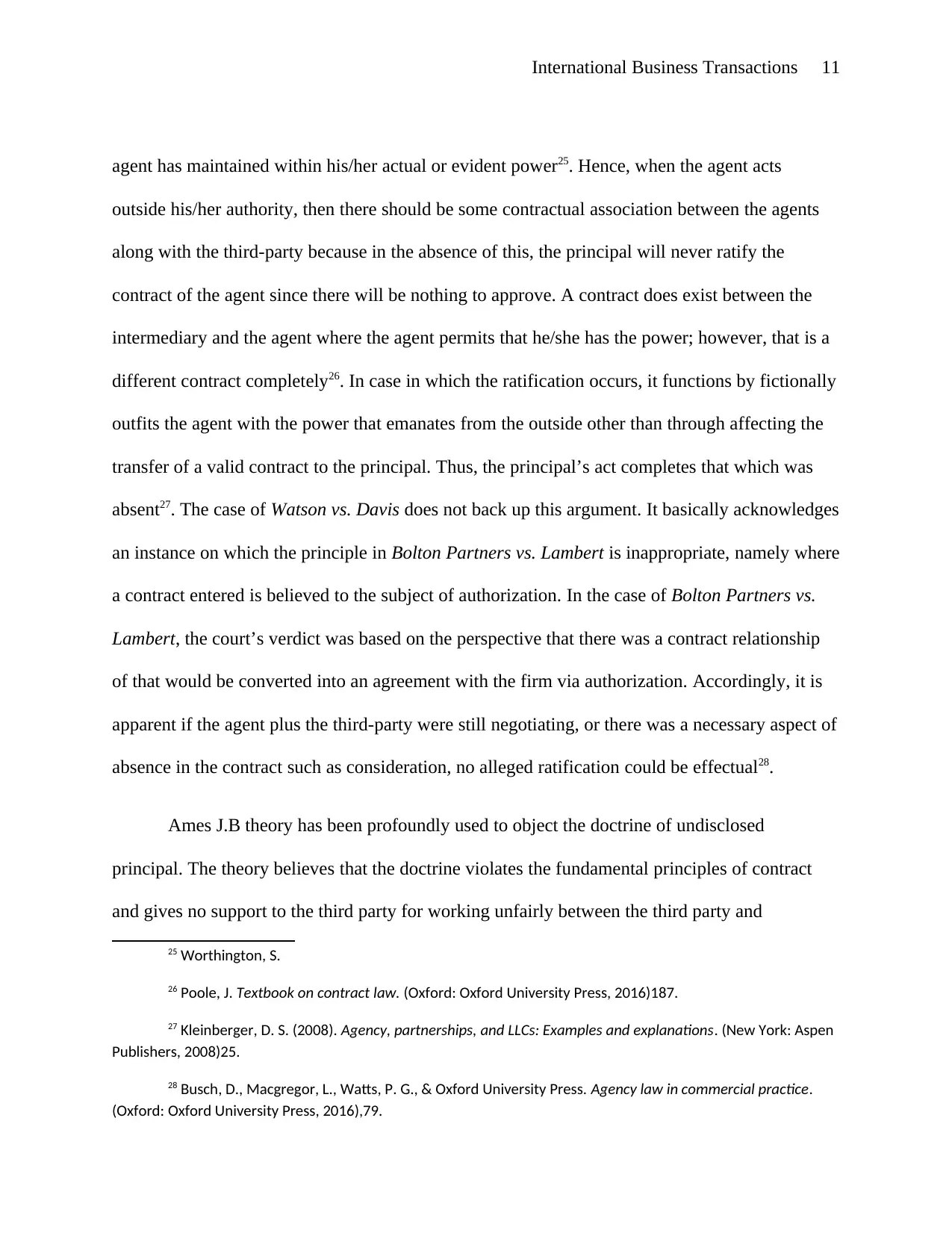
International Business Transactions 11
agent has maintained within his/her actual or evident power25. Hence, when the agent acts
outside his/her authority, then there should be some contractual association between the agents
along with the third-party because in the absence of this, the principal will never ratify the
contract of the agent since there will be nothing to approve. A contract does exist between the
intermediary and the agent where the agent permits that he/she has the power; however, that is a
different contract completely26. In case in which the ratification occurs, it functions by fictionally
outfits the agent with the power that emanates from the outside other than through affecting the
transfer of a valid contract to the principal. Thus, the principal’s act completes that which was
absent27. The case of Watson vs. Davis does not back up this argument. It basically acknowledges
an instance on which the principle in Bolton Partners vs. Lambert is inappropriate, namely where
a contract entered is believed to the subject of authorization. In the case of Bolton Partners vs.
Lambert, the court’s verdict was based on the perspective that there was a contract relationship
of that would be converted into an agreement with the firm via authorization. Accordingly, it is
apparent if the agent plus the third-party were still negotiating, or there was a necessary aspect of
absence in the contract such as consideration, no alleged ratification could be effectual28.
Ames J.B theory has been profoundly used to object the doctrine of undisclosed
principal. The theory believes that the doctrine violates the fundamental principles of contract
and gives no support to the third party for working unfairly between the third party and
25 Worthington, S.
26 Poole, J. Textbook on contract law. (Oxford: Oxford University Press, 2016)187.
27 Kleinberger, D. S. (2008). Agency, partnerships, and LLCs: Examples and explanations. (New York: Aspen
Publishers, 2008)25.
28 Busch, D., Macgregor, L., Watts, P. G., & Oxford University Press. Agency law in commercial practice.
(Oxford: Oxford University Press, 2016),79.
agent has maintained within his/her actual or evident power25. Hence, when the agent acts
outside his/her authority, then there should be some contractual association between the agents
along with the third-party because in the absence of this, the principal will never ratify the
contract of the agent since there will be nothing to approve. A contract does exist between the
intermediary and the agent where the agent permits that he/she has the power; however, that is a
different contract completely26. In case in which the ratification occurs, it functions by fictionally
outfits the agent with the power that emanates from the outside other than through affecting the
transfer of a valid contract to the principal. Thus, the principal’s act completes that which was
absent27. The case of Watson vs. Davis does not back up this argument. It basically acknowledges
an instance on which the principle in Bolton Partners vs. Lambert is inappropriate, namely where
a contract entered is believed to the subject of authorization. In the case of Bolton Partners vs.
Lambert, the court’s verdict was based on the perspective that there was a contract relationship
of that would be converted into an agreement with the firm via authorization. Accordingly, it is
apparent if the agent plus the third-party were still negotiating, or there was a necessary aspect of
absence in the contract such as consideration, no alleged ratification could be effectual28.
Ames J.B theory has been profoundly used to object the doctrine of undisclosed
principal. The theory believes that the doctrine violates the fundamental principles of contract
and gives no support to the third party for working unfairly between the third party and
25 Worthington, S.
26 Poole, J. Textbook on contract law. (Oxford: Oxford University Press, 2016)187.
27 Kleinberger, D. S. (2008). Agency, partnerships, and LLCs: Examples and explanations. (New York: Aspen
Publishers, 2008)25.
28 Busch, D., Macgregor, L., Watts, P. G., & Oxford University Press. Agency law in commercial practice.
(Oxford: Oxford University Press, 2016),79.
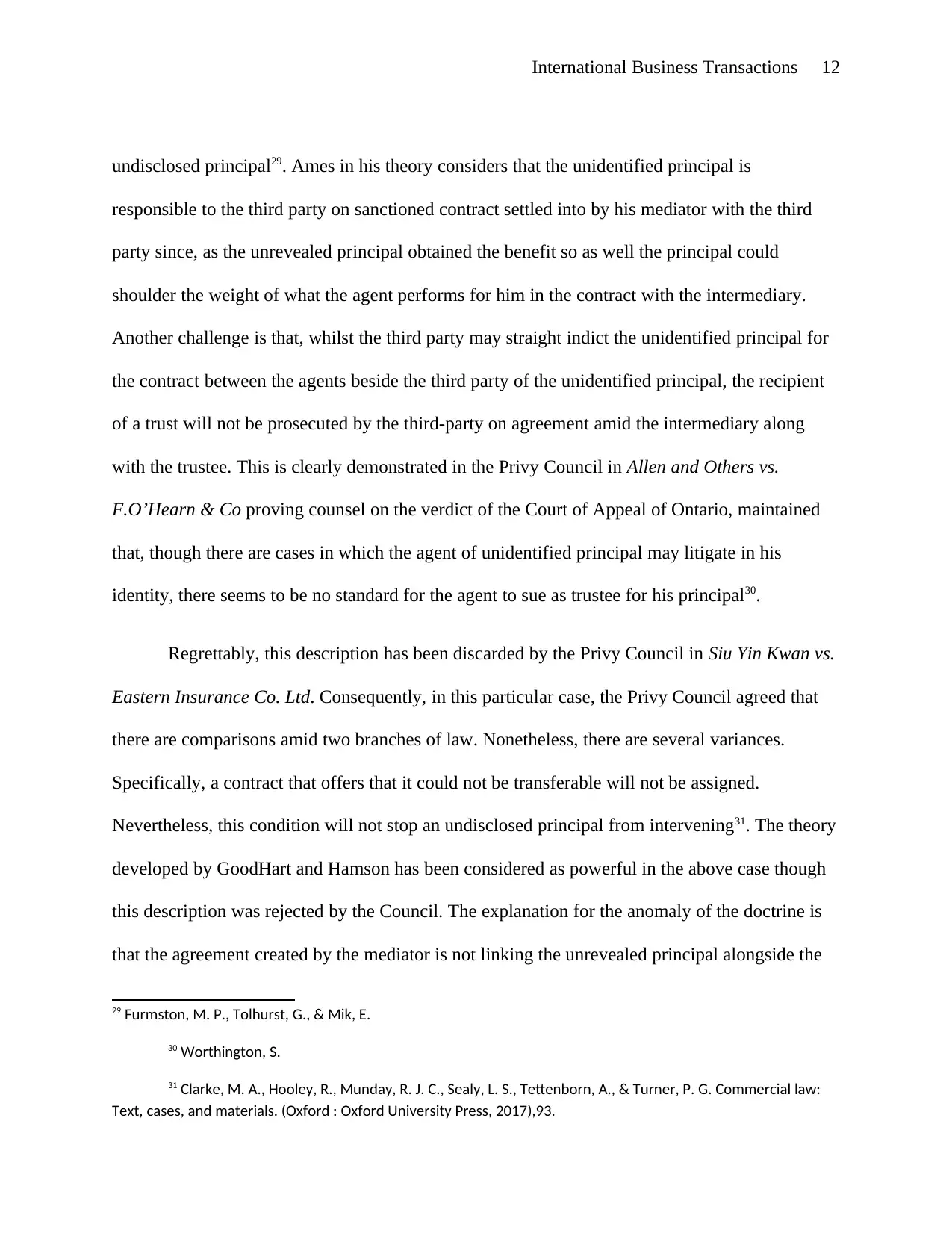
International Business Transactions 12
undisclosed principal29. Ames in his theory considers that the unidentified principal is
responsible to the third party on sanctioned contract settled into by his mediator with the third
party since, as the unrevealed principal obtained the benefit so as well the principal could
shoulder the weight of what the agent performs for him in the contract with the intermediary.
Another challenge is that, whilst the third party may straight indict the unidentified principal for
the contract between the agents beside the third party of the unidentified principal, the recipient
of a trust will not be prosecuted by the third-party on agreement amid the intermediary along
with the trustee. This is clearly demonstrated in the Privy Council in Allen and Others vs.
F.O’Hearn & Co proving counsel on the verdict of the Court of Appeal of Ontario, maintained
that, though there are cases in which the agent of unidentified principal may litigate in his
identity, there seems to be no standard for the agent to sue as trustee for his principal30.
Regrettably, this description has been discarded by the Privy Council in Siu Yin Kwan vs.
Eastern Insurance Co. Ltd. Consequently, in this particular case, the Privy Council agreed that
there are comparisons amid two branches of law. Nonetheless, there are several variances.
Specifically, a contract that offers that it could not be transferable will not be assigned.
Nevertheless, this condition will not stop an undisclosed principal from intervening31. The theory
developed by GoodHart and Hamson has been considered as powerful in the above case though
this description was rejected by the Council. The explanation for the anomaly of the doctrine is
that the agreement created by the mediator is not linking the unrevealed principal alongside the
29 Furmston, M. P., Tolhurst, G., & Mik, E.
30 Worthington, S.
31 Clarke, M. A., Hooley, R., Munday, R. J. C., Sealy, L. S., Tettenborn, A., & Turner, P. G. Commercial law:
Text, cases, and materials. (Oxford : Oxford University Press, 2017),93.
undisclosed principal29. Ames in his theory considers that the unidentified principal is
responsible to the third party on sanctioned contract settled into by his mediator with the third
party since, as the unrevealed principal obtained the benefit so as well the principal could
shoulder the weight of what the agent performs for him in the contract with the intermediary.
Another challenge is that, whilst the third party may straight indict the unidentified principal for
the contract between the agents beside the third party of the unidentified principal, the recipient
of a trust will not be prosecuted by the third-party on agreement amid the intermediary along
with the trustee. This is clearly demonstrated in the Privy Council in Allen and Others vs.
F.O’Hearn & Co proving counsel on the verdict of the Court of Appeal of Ontario, maintained
that, though there are cases in which the agent of unidentified principal may litigate in his
identity, there seems to be no standard for the agent to sue as trustee for his principal30.
Regrettably, this description has been discarded by the Privy Council in Siu Yin Kwan vs.
Eastern Insurance Co. Ltd. Consequently, in this particular case, the Privy Council agreed that
there are comparisons amid two branches of law. Nonetheless, there are several variances.
Specifically, a contract that offers that it could not be transferable will not be assigned.
Nevertheless, this condition will not stop an undisclosed principal from intervening31. The theory
developed by GoodHart and Hamson has been considered as powerful in the above case though
this description was rejected by the Council. The explanation for the anomaly of the doctrine is
that the agreement created by the mediator is not linking the unrevealed principal alongside the
29 Furmston, M. P., Tolhurst, G., & Mik, E.
30 Worthington, S.
31 Clarke, M. A., Hooley, R., Munday, R. J. C., Sealy, L. S., Tettenborn, A., & Turner, P. G. Commercial law:
Text, cases, and materials. (Oxford : Oxford University Press, 2017),93.
⊘ This is a preview!⊘
Do you want full access?
Subscribe today to unlock all pages.

Trusted by 1+ million students worldwide
1 out of 19
Related Documents
Your All-in-One AI-Powered Toolkit for Academic Success.
+13062052269
info@desklib.com
Available 24*7 on WhatsApp / Email
![[object Object]](/_next/static/media/star-bottom.7253800d.svg)
Unlock your academic potential
Copyright © 2020–2026 A2Z Services. All Rights Reserved. Developed and managed by ZUCOL.




